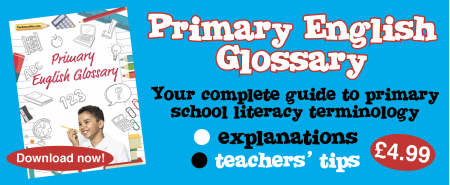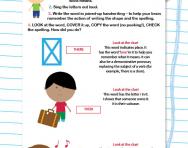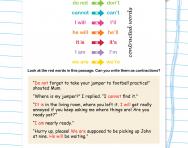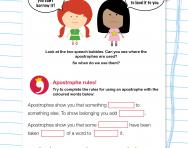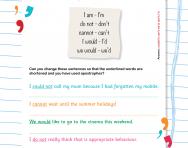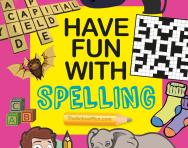What are contracted words or contractions?
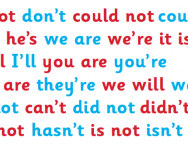
What are contracted words?
Contracted words, also known as contractions (the term used in the 2014 revised national curriculum) are short words made by putting two words together. Letters are omitted in the contraction and replaced by an apostrophe. The apostrophe shows where the letters would be if the words were written in full.
Examples of contracted words (original two words and contraction / contracted words)
| do not | don’t |
| is not | isn’t |
| he is | he’s |
| we are | we’re |
| I will | I’ll |
| you are | you’re |
| they are | they’re |
| we will | we’ll |
| cannot | can’t |
| did not | didn’t |
| has not | hasn’t |
| could not | couldn’t |
| it is | it’s |
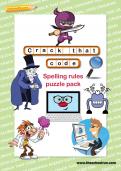
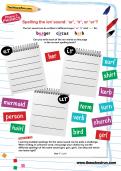
Claim FREE Spelling Resources Today
- Spelling workbooks
- Step-by-step programme
- Spelling test packs
- 100s of worksheets & games
Contractions are used a lot in everyday speech, so children will be familiar with these words but may not know where they come from and the grammatical terminology we use to describe them is ‘contracted’.
Contractions can be used in speech and informal writing such as writing notes or writing to friends and family, but should be avoided for formal writing where the original two words should be used (for example, do not rather than don’t).
When are contractions taught in primary school?
How are contracted words taught in KS1 and KS2?
The teacher will introduce the term and show children examples. They will discuss when and how they are used. The teacher will model using the contractions in writing and model identifying contractions in texts when reading. The children may be given fun activities to complete individually or in small groups, such as:
- Matching the two original words to the contraction
- Playing ICT games to match the original words to the contraction
- Sorting the contractions according to the missing / omitted letters
- Identifying and highlighting contractions in texts
Children are often given contracted words as spelling lists to learn at home or as part of their homework.
3 steps to using contracted words correctly
- Remember the apostrophe is used in place of a letter(s).
- Be careful not to confuse the use of an apostrophe for a contraction with apostrophes for possession.
- Try using both the two-word and contracted versions of the words when talking to your child to help them to learn what the contractions mean, for example using both 'do not' and 'don’t' during discussions.
Common contracted words in English list
| BE | WILL | WOULD | HAVE | HAD | |
| I | I'm I am | I'll I will | I'd I would | I've I have | I'd I had |
| YOU | you're you are | you'll you will | you'd you would | you've you have | you'd you had |
| HE | he's he is | he'll he will | he'd he would | he's he has | he'd he had |
| SHE | she's she is | she'll she will | she'd she would | she's she has | she'd she had |
| IT | it's it is | it'll it will | it'd it would | it's it has | it'd it had |
| WE | we're we are | we'll we will | we'd we would | we've we have | we'd we had |
| THEY | they're they are | they'll they will | they'd they would | they've they have | they'd they had |
| THAT | that's that is | that'll that will | that'd that would | that's that has | that'd that had |
| WHO | who's who is | who'll who will | who'd who would | who's who has | who'd who had |
| WHAT | what's / what're what is / what are | what'll what will | what'd what would | what's what has | what'd what had |
| WHERE | where's where is | where'll where will | where'd where would | where's where has | where'd where had |
| WHEN | when's when is | when'll when will | when'd when would | when's when has | when'd when had |
| WHY | why's why is | why'll why will | why'd why would | why's why has | why'd why had |
| HOW | how's how is | how'll how will | how'd how would | how's how has | how'd how had |
English contracted words (negating a verb) list
Two-word form, followed by the contraction
| is not | isn't |
| are | aren't |
| was not | wasn't |
| were not | weren't |
| have not | haven't |
| has not | hasn't |
| had not | hadn't |
| will not | won't |
| would not | wouldn't |
| do not | don't |
| does not | doesn't |
| did not | didn't |
| cannot | can't |
| could not | couldn't |
| should not | shouldn't |
| might not | mightn't |
| must not | mustn't |
Contracted words: common mistakes to look out for
Children often write 'of' instead of the contracted form of 'have', 've' (so "I could of" instead of "I could've").
It's is the contracted form of it is. Its isn't the same thing – it's a possessive pronoun meaning "of it".
The contraction they're is a homophone (it sounds just like the words their and there, but has a different meaning).

Give your child a headstart
- FREE articles & expert information
- FREE resources & activities
- FREE homework help
